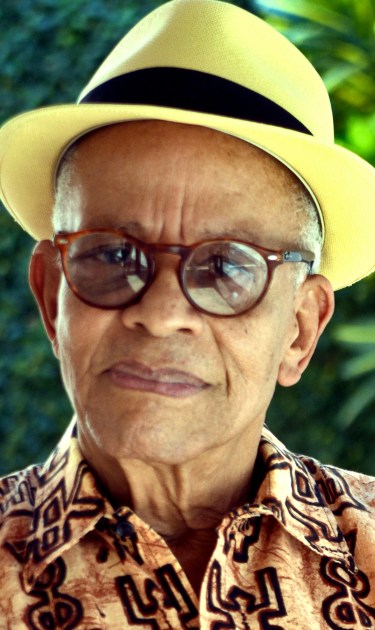Whenever he tunes into the music station of his subscription TV in Rio de Janeiro, composer Nei Lopes gets deeply bothered by the fact that bossa nova tracks—particularly the English versions—are often classified as jazz. “When people listen to Sarah Vaughan singing bossa nova, they need to know they are listening to Brazilian music of African origin,” he tells Remezcla, explaining that bossa nova fundamentals come from samba, a genre with undeniable African influence.
The historical neglect of Brazilian culture’s African roots is a reality that Lopes knows well. He has actively participated in Rio’s samba scene for most of his 81-year-old life. Because of this, Lopes has seen how the international music industry systematically looked at samba as a “minor” genre and how samba schools (communities that preserve and practice samba culture) gradually disconnected from their roots.
Standing for reconnection, as Lopes developed his work in literature and music, he placed the African legacy at the center of samba’s history. As one of Brazil’s most respected thinkers of samba, he has published over 40 books and released over 350 songs. Lopes is also a prominent voice reminding us that the genre must be Afro-centered and, ultimately, antiracist.
While music and dance expressions that shaped samba have existed across Brazil for centuries, “there still is a profound ignorance of what samba is,” Lopes states. In its purest essence, samba is rhythm. He notes that its uniqueness lies in the fact that it blends its African essence with other aesthetical elements that developed in Brazil through time. As explained in his 2003 book “Sambeabá: o samba que não se aprende na escola” about the genre, it was most notably the music from the Bantu ethnicities. “It arrived [in Brazil] ‘barely naked’ and has slowly gained new sound gradations,” he tells Remezcla.

As samba arose, it wasn’t widely welcomed by Brazilian society—quite the contrary. Historically, samba has been subjected to a complex process of stigmatization. According to the award-winning “Dictionary of the Social History of Samba” (2015), co-written by Lopes, repression against the genre was an official state policy in the first decades of the 20th century. Claiming that samba was an environment of “vagrancy,” the police would often arrest and beat musicians and confiscate their instruments.
However, samba gained different official contours starting in the 1930s. Despite the racism that continued to operate against African-originated cultural expressions, samba gradually became the cultural symbol of a national identity project incentivized by the state. Once a depreciated artistic expression of predominantly Black communities, samba—specifically Rio’s urban samba—entered the cultural industry and spread across the country, especially through state-owned radio stations.
But the popularity that samba reached from then on didn’t come without turning it into a “product of the consumption society,” as Lopes puts it. He adds that samba schools were particularly affected by these dynamics. Birthed in the favelas and outskirts of Rio in the late 1920s, samba schools are communities that originally revolved around the artistic creation of samba, including dances, lyrics, and ways of playing the instruments. They also held the maintenance of values, traditions, and knowledge adjacent to the culture of samba. However, samba schools in the ‘70s, Lopes notes, became a product of tourism and entertainment. They began incorporating outsider members and abandoning their original earthen-floor venues; something essential got lost.

“When people listen to Sarah Vaughan singing bossa nova, they need to know they are listening to Brazilian music of African origin.”
When the carnival contest became more important than the everyday community relations, Lopes joined Quilombo, a samba school founded in 1975 with an aim to rescue the African essence of Rio’s carnival. More than a samba school, “Quilombo was an arm of the Black movement,” affirms Lopes. He is the author of one of Quilombo’s most famous songs, “Ao Povo em Forma de Arte,” which places the contribution of African civilizations at the center of Brazil’s cultural formation.
Samba chose Nei Lopes long before he became who he is. Coming from a Black low middle-class family from Rio’s outskirts composed of musicians who frequently played at home, his relatives introduced him to the genre at an early age. He began taking samba more seriously after the 1960s when he joined a traditional Rio samba school and had his debut single, “Figa de Guiné,” recorded in 1972. The song alludes to the spiritual protection from candomblé, one of Brazil’s many African-originated religions.
But choosing samba for a living wasn’t simple. “My parents saw the people from the samba environment as people they wouldn’t want around,” he shares. He had left a career in law to become the first professional samba artist in his family of amateur samba musicians.

A further understanding of Brazil’s African legacy inspired Lopes to co-create the album A Arte Negra de Wilson Moreira e Nei Lopes (1980). Considered by critics as one of the anthological samba albums, A Arte Negra highlights samba’s African essence and presents a work that aims to inspire interest and respect for samba music.
As the historical protagonist of Brazil’s cultural identity, samba might still not enjoy the respect it deserves. But for Lopes, he currently experiences well-deserved acknowledgment after a lifetime dedicated to shedding light on the African legacy of the Brazilian culture. Last year, he received honorary degrees from two of the most prestigious Brazilian universities. At this year’s carnival, which took place in February, he was the theme of a Rio samba school for the first time in his life.
On the Carnival parades these days, Lopes is glad to see samba schools more often paying tribute to their African ancestry. It’s a reflection on the irreversible advances to fight racism in Brazil’s society, he says. But, until the day that African legacy sounds redundant, Lopes’ work will continue to enlighten Brazilians about their past.





